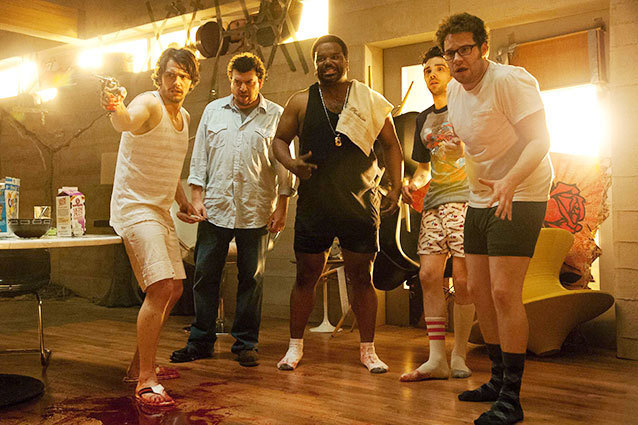
Columbia Pictures
Many would have been at least marginally on board with 100 minutes of celebrity cameos and screwball humor. That's how This Is the End was
being sold, unsurprisingly: on its endless array of one-note celebrity
appearances and the sort of pithy, naturalistic one liners for which
this gang of Apatowlets has become famous. Another drug- and pop
culture-infused high stakes comic adventure? Why not? Pineapple Express was enough of a good time to keep M.I.A. periodically in our heads for the years to follow. But This Is the End would prove, from the very first second of its opening shot, to be nothing like its Rogen and Goldberg-helmed predecessor.Okay, not nothing. It's still got plenty of drugs, pop culture, and nutty gags. But that's not what it's about. Yes, this movie is actually, very adamantly, about something. And it's fascinating.
We realize that we're in for something unexpected when the movie introduces itself with a wordless, understated vantage point of Seth Rogen waiting humbly and uncomfortably in a Los Angeles airport. No over-the-top antics or goofy fantastical foreshadowing thrust upon us en media res to set the mood: instead, we're anchored way, way down to Earth as Seth reunites with lifelong pal Jay Baruchel, who is in town for the weekend. The moments to follow their gleeful embrace have the pair celebrating one another and their time together... a glee cut short when Seth introduces the idea of attending a party at James Franco's mansion that night.
Here's where the conflict comes in. Not a conflict developed simply to inject some character weight into a story about the apocalypse, but the actual central conflict of the movie. This, as we learn from an extensive, detailed conversation about Jay's aversion to Seth's Hollywood gang (which includes Franco, Jonah Hill, and Craig Robinson), is a story about this group of friends. No, quite accesibly, the very nature of any group of friends.
Stuck in a house together after the apocalypse rains down upon the Earth (sinkholes and fires and good people ascending to heaven and demons and all that jazz, it's pretty heavy), Seth, Jay, Franco, Jonah, and Craig metaphorically exemplify the isolated structure of a social clique. Like your high school group, your college house, your work cronies, or the bunch of kids you met on Birthright, this group is an island. And in this self-contained society, no matter how sure of itself that it might be, there are inevitably going to be rifts.
Feelings of imbalance, losing touch, in-group fighting, and that one friend that nobody likes or trusts (embodied here by a scene-stealing Danny McBride, who shows up midway through the adventure to hike up the chaos) are all issues painted quite vividly by This Is the End, using the apocalyptic backdrop to represent the world-ending turmoils that accompany any cherished friend group. And, of course, using the brand of comedy for which these guys are known to make the story all that more engaging. While any one of us might have thought, "Man, I'd love to write a movie about my group of friends," the thought always comes with a heavy-hearted realization that few people outside your group of friends would actually care all that much about them. But Rogen has the luxury of people very much caring about his friends. And so, they're the perfect gang through which this story might be told.
At the heart of the movie is Seth's relationship with Jay, the odd man out of the Hollywood clique, feeling overwhelmed by the eccentric Franco, intimidated by relative stranger Craig, and fully contemptuous in regards to the phony he considers Jonah to be. Seth, the group favorite, deals with the fissures, undertaking his own anxieties as the people around him turn on one another. Odds are, you've been someone in this situation. Odds are, one of the groups through which you've traversed have seen this type of calamity. Although we might consider our social circles to be entirely self-sustaining (as Franco assures the lot that they are, calling for everyone to stay put in his L.A. home), they are the most delicate things we have.
Delivered with a shocking amount of substance and enough of that beloved brand of Rogen-and-the-gang comedy to keep things lively and fun throughout, This Is the End tells a sociological story that even puts the friendship arcs of Superbad and Pineapple Express to shame. The sinkholes, demons, and lack of food light a fire under the central fivesome here. But as their friendships appear to be the whole world to these men, the crumbling of these friendships are the real apocalypse.
4.5/5
No comments:
Post a Comment